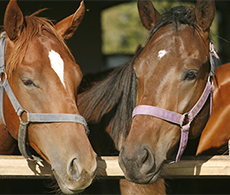
How do horses help with human mental health?
To celebrate World Mental Health Day, we explore the mental health benefits of spending time around horses, and explain what is involved with equine-assisted therapy.
Have you ever felt really low or had a bad day, but felt instantly better the moment you’re in the presence of your horse? It’s not a happy coincidence that spending time with our horses can make us feel good. Winston Churchill once famously said: ‘There is something about the outside of a horse that is good for the inside of a man’, and we totally agree. The saying perfectly sums up why, for thousands of years, humans have sought the physical and mental benefits of horses.
Using horses as a form of therapy can be traced as far back as the ancient Greeks when Hippocrates wrote about the emotional and physical benefits of riding. But it’s not just riding horses and being around their quiet, sensitive and intuitive personalities that boosts our mood. It’s also the simple act of being outside in the fresh air, surrounded by nature and exercising that has a positive impact on our mental health.
There’s even research to prove how beneficial horses can be to human mental health. One research study published by the British Horse Society concluded that horse riding stimulated many positive psychological feelings, reducing depression by 30% as well as lowering the chance of dementia by 30%.
Horse therapy isn’t just for riders either – anyone can make the most of the benefits horses have to offer.
What is equine therapy?
Equine therapy is the use of horses as part of a therapy programme to help people improve their mental health. We have been using horses to help people with physical disabilities since the 1950s, but in more recent years, we’ve also started to see the positive impact horses can have on our mental health, too.
During equine therapy sessions, therapists use horses to help people see and understand themselves better and encourage them to think about things differently.
The therapist will use exercises such as leading the horse over and through obstacles, which require the handler to be creative in their decisions and consider how they respond and act towards the horse.
Once the exercise has been completed, the person will then discuss their experience with the therapist, discussing how it made them feel and whether they felt they were successful, which can help people to learn more about themselves and their behaviour.
Some people find themselves building a bond with the horse over a number of sessions, and this in itself can be very healing and help improve their mindset.
What makes horses so useful in therapy?
There are a number of reasons why horses are such effective therapy animals:
- The first thing most non-horsey people notice about horses is how big and powerful they are. Overcoming this fear by spending time with them is a great confidence boost and can be very liberating.
- Horses are social animals and naturally seek the company of others, which makes them easy to build bonds with. They live in the moment, so respond instantly through body language and often know how you feel even before you do, which encourages you to challenge your own behaviour and actions.
- They are very good at reading body language and responding. They also have the ability to mirror how we feel, so if we are feeling aggressive and angry, they are likely to not want to interact with us. On the flip side, if we are calm and confident, they will be more likely to respond positively. It’s another way that horses encourage us to challenge our actions.
- Horses are great at showing us their personalities and will often respond to us in a caring manner if we are upset, making them a natural companion. They also like to have fun and will happily turn some exercises into games.
What can equine therapy help with?
We’re yet to fully understand the actual effectiveness of equine-assisted therapy as research is still being conducted, but it is thought that it can help with problems such as:
- Anxiety – horses are great at bringing people into the present moment, which helps stop them overthink things
- Low self-esteem – working with big animals such as horses builds self-confidence and a sense of achievement, as does building a bond with a horse
- Addiction – horses teach people to trust and get in touch with their own emotions, which can help them work through emotional problems that can lead to addiction
- Antisocial behaviour – working with horses develops communication and trust in others and can help regulate emotions such as anger and aggression
- Trauma – the gentle and non-judgemental nature of horses helps people rebuild trust and confidence in others again
- Depression – being outside in nature, the physical aspect of working with horses and being in the moment can help people battling depression
So, remember, if you’re feeling a bit low, or having a bad time, your horse is ready and waiting to help you feel better.
Does your horse help you with your mental health? If so, we’d love to find out. Head to our Facebook page and let us know.


